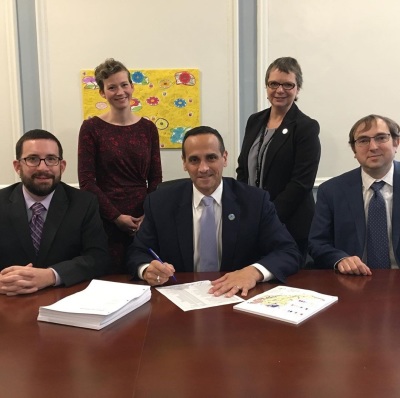Mass. city recognizes domestic partnerships with 3 or more consenting adults

Somerville, a liberal city in Massachusetts, became perhaps the first city in the United States to recognize domestic partnerships involving three or more people after Mayor Joe Curtatone signed an ordinance into law providing sweeping latitude to redefine family.
Miles Bratton, 47, told The New York Times that thanks to the new municipal law she would consider forming a domestic partnership with her “platonic lifemate” Anne-Marie Taylor, 43.
Their new status as domestic partners would allow them to buy a house together and share benefits, like health insurance. They would also be able to have external romantic relationships.
Taylor said they previously held back from registering as domestic partners because the language her workplace used required that they be romantic partners.
“That has not felt right, so we haven’t done it,” she said. “Somerville is coming out and saying, ‘Hey, family can be a lot of other things, other than just two people.’”
A domestic partnership is traditionally defined as a legally-recognized relationship that allows nonmarried couples the same or similar benefits as those provided to married couples. Not all states recognize domestic partnerships within a legal context and Somerville did not have a domestic partnership ordinance before now.
The Somerville ordinance broadened the scope of the tradition definition of domestic partnerships with subtle tweaks. Somerville’s ordinance defines a domestic partnership as an “entity formed by people,” rather than by "two persons." Language includes "they" and "all," rather than “he and she” or “both.”
J.T. Scott, a city councilor who supported the new domestic partner ordinance, told The New York Times that he believed it was the first one of its kind in the country.
“People have been living in families that include more than two adults forever,” Scott said. “Here in Somerville, families sometimes look like one man and one woman, but sometimes it looks like two people everyone on the block thinks are sisters because they’ve lived together forever, or sometimes it’s an aunt and an uncle, or an aunt and two uncles, raising two kids.”
He noted that Somerville, which has a population of 80,000, had about two dozen polyamorous households.
“This is simply allowing that change, allowing people to say, ‘This is my partner and this is my other partner,’” he said. “It has a legal bearing, so when one of them is sick, they can both go to the hospital.”
Lance Davis, the councilor who drafted the ordinance which got unanimous support, said he doesn’t believe it’s the government’s place to define family.
“I don’t think it’s the place of the government to tell people what is or is not a family,” Davis, who is a lawyer, noted at a recent meeting. “Defining families is something that historically we’ve gotten quite wrong as a society, and we ought not to continue to try and undertake to do so.”
The new ordinance comes after the American Psychological Association established a task force on "consensual non-monogamy," an effort to reduce "stigma" on persons who practice polyamory.





















